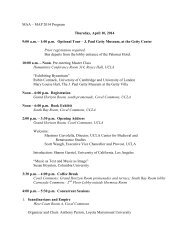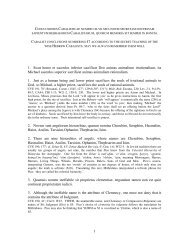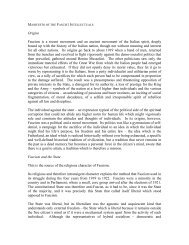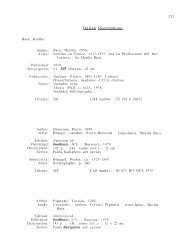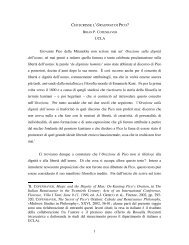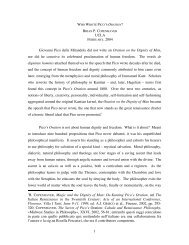1 (1) Pythagoras of Samos instructed the region of Italy once called ...
1 (1) Pythagoras of Samos instructed the region of Italy once called ...
1 (1) Pythagoras of Samos instructed the region of Italy once called ...
Create successful ePaper yourself
Turn your PDF publications into a flip-book with our unique Google optimized e-Paper software.
(32) Coming to <strong>the</strong> third term, however, what should I say about <strong>the</strong> difference between<br />
‘I do good’ and ‘doing well’ except that ‘doing good’ is not used? But <strong>the</strong>se people want<br />
it to be possible for ‘good’ to be done ‘not well,’ which is quite absurd. Suppose a person<br />
needing money annoys me and I take out my stick and give him a scolding, should I not<br />
be said ‘to have done good not well’? Who would really deny that I have done well by<br />
showing <strong>the</strong> beggar my stick? But because I scolded <strong>the</strong> beggar I have not done well, and<br />
surely I have not done good. Thus it must be said that <strong>the</strong>re were two sides to <strong>the</strong> act, one<br />
good, <strong>the</strong> o<strong>the</strong>r not good: by showing <strong>the</strong> stick I have done both well and good, but by<br />
scolding nei<strong>the</strong>r well nor good.<br />
(33) Accordingly, acting ‘justly’ and doing <strong>the</strong> ‘just’ are also <strong>the</strong> same, if only such talk<br />
occurred, though we would prefer to say it ei<strong>the</strong>r with <strong>the</strong> adverb, ‘do it reverently,<br />
piously, justly and well’ but not ‘do <strong>the</strong> reverent, pious, just and good,’ or with <strong>the</strong> plural<br />
number, ‘do reverent, pious, just and good deeds.’ (34) As Aristotle writes in <strong>the</strong><br />
Politics: “To act justly is impossible for those who do not do just deeds.” 57 And yet <strong>the</strong><br />
expression containing <strong>the</strong>se words is absurd, as Quintilian says: “I would think it<br />
ridiculous to add it to <strong>the</strong>m except that Cicero uses it, ‘those who do <strong>the</strong> just thing, doing<br />
justly,’ and evidence is certainly not lacking since ‘common pasture is permitting<br />
common pasturing.’” 58 We say ‘I seek <strong>the</strong> just,’ however, for ‘I seek <strong>the</strong> just thing.’<br />
57 Not at Arist. Pol. 1323a31-2, as in Zippel, though <strong>the</strong> context is right.<br />
58 Zippel cites Quint. 5.10.85.<br />
14<br />
2/21/05 9:35 PM 14/44



